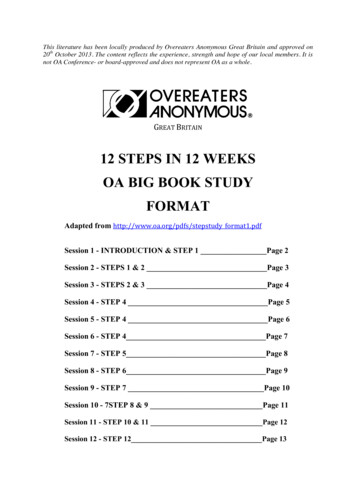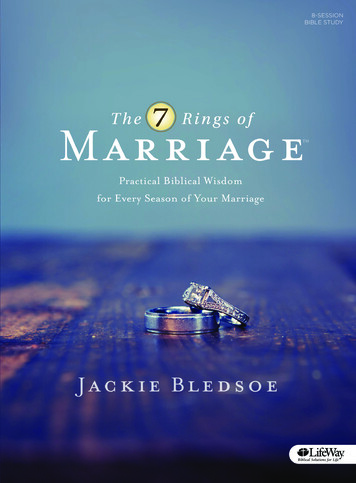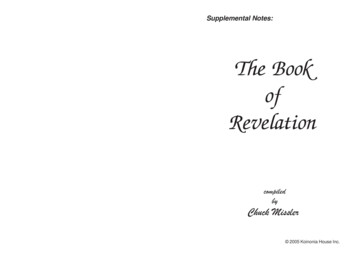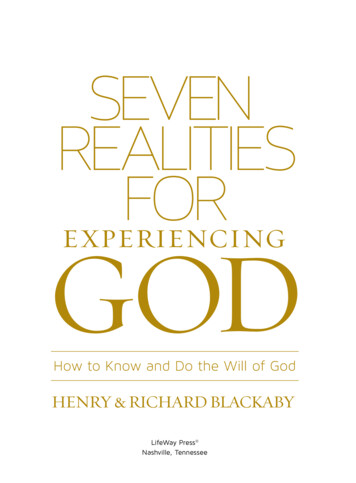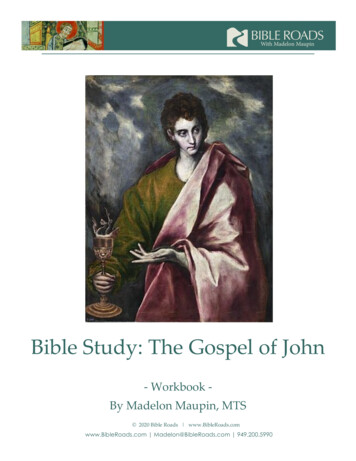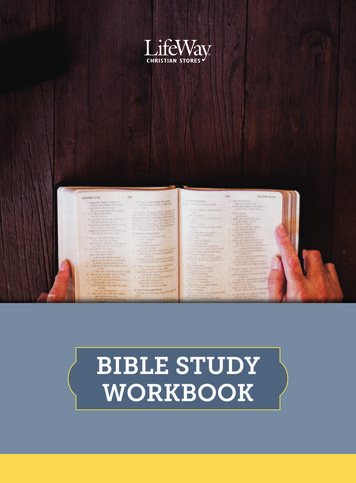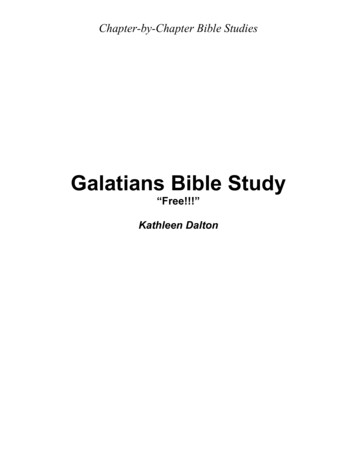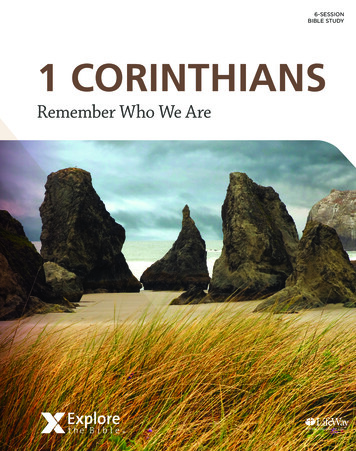
Transcription
6-SESSIONBIBLE STUDY1 CORINTHIANSRemember Who We Are
1 CORINTHIANSRemember Who We AreLifeWay Press Nashville, Tennessee
EXPLORE THE BIBLE: 1 Corinthians—Remember Who You Are 2017 LifeWay Press ISBN 978-1-4627-9287-0 Item 005801650Let the Word dwell in you.Dewey decimal classification: 227.2Subject headings: BIBLE. N.T. 1 CORINTHIANS \CHURCH \ CHRISTIAN LIFEERIC GEIGERVice President, LifeWay ResourcesMICHAEL KELLYDirector, Groups MinistryCLINT PRESSLEYGeneral EditorWith Explore the Bible groups can expect to engageScripture in its proper context and be better preparedto live it out in their own context. These book-by-bookstudies will help participants—❯❯grow in their love for Scripture;❯❯gain new knowledge about what the Bible teaches;❯❯develop biblical disciplines;❯❯internalize the Word in a way that transformstheir /web/explorethebibleSend questions/comments to: Content Editor, Explorethe Bible: Small-Group Study; One LifeWay Plaza;Nashville, TN 37234.Printed in the United States of AmericaFor ordering or inquiries visit LifeWay.com; write toLifeWay Small Groups; One LifeWay Plaza; Nashville, TN37234; or call toll free 800-458-2772.We believe that the Bible has God for its author;salvation for its end; and truth, without any mixtureof error, for its matter and that all Scripture is totallytrue and trustworthy. To review LifeWay’s doctrinalguideline, please visit lifeway.com/doctrinalguideline.Scripture quotations are taken from the ChristianStandard Bible , Copyright 2017 by Holman BiblePublishers . Used by permission. Christian Standard Bible and CSB are federally registered trademarks of HolmanBible Publishers.Session 1 quotation: John Piper, This MomentaryMarriage: A Parable of Permanence (Wheaton, IL:Crossway, 2009), 117. Session 2 quotation: C. S. Lewis,Mere Christianity (New York: HarperOne, 1980), 49.Session 3 quotation: John Wesley, Letters of JohnWesley, ed. George Eayrs and Augustine Birrell(London: Hodder and Stoughton, 1915), 423. Session 4quotation: Saint Francis of Assisi, as quoted in MichaelJ. Akers, Enriching Christian Doctrine and Character(Bloomington IN: AuthorHouse, 2009), 25. Session 5quotation: Martin Luther King Jr., as quoted in MichaelHolmes, I Shall Raise Thee Up (Maitland FL: Xulon, 2009),127. Session 6 quotation: R. C. Sproul, Discovering theIntimate Marriage (Ada, MI: Bethany House, 1975), 76.
CONTENTSAbout This Study 4General Editor 4About 1 Corinthians 5Session 1United in Christ (1 Corinthians 1:10-25) 6Session 2Glorifying God (1 Corinthians 6:12-20) 16Session 3Influencing for Christ (1 Corinthians 9:19-27; 10:31-33; 11:1) 26Session 4Remembering the Sacrifice (1 Corinthians 11:17-29) 36Session 5Serving God’s People (1 Corinthians 12:4-12,21-26) 46Session 6Understanding Love (1 Corinthians 13) 56Leader Guide 66Tips for Leading a Group 78
ABOUT THIS STUDYPassionate. Powerful. Purposeful. These three terms are accurate, comprehensive descriptors of Paul’sletters to the Corinthian church. Both letters contain passionate responses to doctrinal and practicalmatters that needed attention. Each section, chapter, and verse is purposeful by design, addressingthose issues with sound theology, keen insight, and gospel-centeredness. Without a doubt, theCorinthian correspondence reveals a powerful presentation of gospel truths and applications, ablywritten in argument and clarity.This Bible study will focus on 1 Corinthians. Key themes of this letter include Christian unity, sexualmorality, women’s roles, spiritual gifts, and the resurrection.The Explore the Bible series will help you know and apply the encouraging and empowering truthof God’s Word. Each session is organized in the following way.UNDERSTAND THE CONTEXT: This page explains the original circumstances and setting of thesession’s focal passage and identifies the primary themes.EXPLORE THE TEXT: This page introduces the session’s Bible passage, providing helpful commentaryand encouraging thoughtful interaction with God through His Word.APPLY THE TEXT: This page helps you and your group members apply the truths you’ve explored.It’s not enough to know what the Bible says. God’s Word has the power to change your life.DAILY EXPLORATION: Go deeper into God’s Word, building on the group experience. Engagein these daily Bible studies, reflect on the questions, record your thoughts, and take action.OBEY THE TEXT: These pages provide opportunities to obey the Scriptures you’ve studiedby responding to questions, memorizing verses, journaling, and praying.LEADER GUIDE: This final section provides discussion starters and suggested questions to helpsomeone lead a group study.GENERAL EDITORClint Pressley serves as the senior pastor of Hickory Grove Baptist Church inCharlotte, North Carolina. He holds a master of divinity from New Orleans BaptistTheological Seminary and is working on a doctor of ministry from SoutheasternBaptist Theological Seminary.4E X PL OR E T H E B I BL E
ABOUT 1 CORINTHIANSThe church has never been perfect. Only the Lord of the church is perfect, a truth that’s abundantlyclear in 1 Corinthians. Here we find the gospel in all its glory and life with all its complexities. TheBook of Ecclesiastes says, “There is nothing new under the sun” (1:9), and Paul’s letter to the churchin Corinth illustrates that truth. Paul wrote to a people who loved Christ but who struggled withdivisions of all kinds, manifold rebellion, and downright immorality. When we read and study thisbook, we’re reminded that although Jesus is Lord of the church, there’s no perfect church.Even still, in 1 Corinthians we learn the centrality of the cross, the meaning of marriage, the danger oflust, and the way a church should be structured. We learn the importance of spiritual gifts, the valueof diversity, and the joy of taking the Lord’s Supper.Paul’s letter to the Corinthian church grounds us in the gospel of Christ and fills us with resurrectionhope. And this hope doesn’t disappoint. This hope gives us strength for endurance so that in ourstruggles we don’t lose heart.First Corinthians serves as a banquet table of gospel truth, served up for the strength and healthof God’s people. At this critical hour an intense and thorough study of this book is sure to bringnourishment to the famished soul and strength to any gospel-centered church.As you study 1 Corinthians, may the Spirit of God use the Word of God to anchor your confidence andhope in the Son of God.For helps on how to use Explore the Bible, tips on howto better lead groups, or additional ideas for leading,visit ministrygrid.com/web/explorethebible. 5
S e s s i o n1United in ChristAll believers share the same salvation and thusshould be unified through that confession.1 Corinthians 1:10-256E X PL OR E T H E B I BL E
Have you been part of a club or an organization that was driven by its purpose?How did that purpose help members deal with differences in the group?A clear purpose keeps some organizations and clubs viable. The organization’s purposeunifies people with different backgrounds and opinions. But purpose alone won’t keep anorganization together; the purpose must be worthy and compelling. A purpose that’s biggerthan the individual or the needs of the group will more likely unify and sustain a group thana purpose that’s reactionary or self-focused.UNDERSTAND THE CONTEXTA church is a group of people from many different walks of life, backgrounds, and interestswho find their unity in the gospel of Jesus Christ. At times divisions occur in the church overmany different things—some significant and some trite. Sometimes we let our preferencesget in the way of our mission, and believers are unnecessarily divided. In this week’s lesson,Paul addressed divisions in the Corinthian church and called the congregation to be united.Although the church in Corinth had significant problems, Paul was thankful that the graceof God had been given to these believers in Christ Jesus (see 1 Cor. 1:4) and that God hadcalled them into fellowship with His Son (see v. 9). They had been sanctified in Christ andcalled as saints (see v. 2), having been enriched in Him in every way (see v. 5). These truthswere important for the Corinthian believers to remember, especially because Paul’s sterncorrection was soon to follow. Paul didn’t begin his letter by exposing his readers’ laundry listof sins but rather pointed them to their true identity in Christ.Paul also mentioned peace. With all of their divisions and problems, Paul wanted the Corinthianbelievers to experience the kind of peace and wholeness the gospel provides. Whatever theircircumstances or difficulties, God had called them to live in peace.Early in this letter, however, Paul raised the issue of problems in the church at Corinth.He would go on to addres these problems—mostly moral and relational but some theological—in this letter. He had a fatherly love for this church, which drove him to confront the problemspresent among its members (see 4:14-15). In the first four chapters of 1 Corinthians, Paulfocused his attention on the disunity that was tearing the church apart.S e s s i o n 1: Un it e d in C hr i s t7
1 CORINTHIANS 1:10-2510 Now I urge you, brothers and sisters, in the name of ourLord Jesus Christ, that all of you agree in what you say,that there be no divisions among you , and that yoube united with the same understanding and the sameconviction. 11 For it has been reported to me about you,my brothers and sisters, by members of Chloe’s people,that there is rivalry among you. 12 What I am saying is this:One of you says, “I belong to Paul,” or “I belong to Apollos,”or “I belong to Cephas ,” or “I belong to Christ.” 13 IsChrist divided? Was Paul crucified for you? Or were youbaptized in Paul’s name? 14 I thank God that I baptizednone of you except Crispus and Gaius, 15 so that no onecan say you were baptized in my name. 16 I did, in fact,baptize the household of Stephanas; beyond that, I don’trecall if I baptized anyone else. 17 For Christ did not sendme to baptize, but to preach the gospel—not with eloquentwisdom, so that the cross of Christ will not be emptiedof its effect. 18 For the word of the cross is foolishness tothose who are perishing, but it is the power of God to uswho are being saved . 19 For it is written, I will destroythe wisdom of the wise, and I will set aside the intelligenceof the intelligent. 20 Where is the one who is wise? Whereis the teacher of the law? Where is the debater of this age?Hasn’t God made the world’s wisdom foolish? 21 For since,in God’s wisdom, the world did not know God throughwisdom, God was pleased to save those who believethrough the foolishness of what is preached. 22 For theJews ask for signs and the Greeks seek wisdom, 23 but wepreach Christ crucified, a stumbling block to the Jews andfoolishness to the Gentiles. 24 Yet to those who are called,both Jews and Greeks, Christ is the power of God andthe wisdom of God, 25 because God’s foolishness is wiserthan human wisdom, and God’s weakness is stronger thanhuman strength.8E X PL OR E T H E B I BL EPassage OutlineCall for Unity(1 Cor. 1:10)Contempt for Divisions(1 Cor. 1:11-16)The Cross That Divides(1 Cor. 1:17-25)Keywords divided church is a weakAchurch. The enemy loves todivide and destroy God’speople (see John 10:10). nity among God’sUpeople requires courage,conviction, clarity, andspeaking God’s “truthin love” (Eph. 4:15). ramaic for “Peter”A(John 1:42), a memberof Jesus’ inner circlewhose ministry wasone of grace, forgiveness,and restoration.S alvation through Christmeans justification(having been saved),sanctification (beingsaved), and glorification(continuing to be saved). Manypeople know factsabout Jesus, but theLord’s divine missionis to help people becomeHis followers.
EXPLORE THE TEXTAfter his introductory comments Paul introduced the serious issue of divisions in the church.He called the church to unity in three specific ways.1. They should agree in what they said.2. There should be no divisions among them.3. They should have the same understanding and the same conviction.If the Corinthian believers were divided among themselves, the mission and the fruitfulnessof the church were in perilous danger.What factors could potentially threaten unity in a church? What steps could be takento ensure that a local church remains unified?KEY DOCTRINE: The church A New Testament church of the Lord Jesus Christ isan autonomous local congregation of baptized believers, associated by covenant in thefaith and fellowship of the gospel.The nature of the rivalry in the Corinthian church is both sad and understandable. It’s sadbecause it was happening, but it’s understandable because of the personalities at the heart ofit. Some claimed to belong to Paul, some to Apollos, some to Cephas, and some to Christ. Thesemen were important leaders who were connected to the church in Corinth in some way. Theyeach played an influential part in the growth of the believers in Corinth. Ironically, some alsoclaimed to belong to Christ. The truth is, all of the Corinthian believers belonged to Him.Where do you see this kind of division in the church today? How does rivalry get in theway of God’s work?For Paul, the cross of Christ was a rallying point and unifier for the church. There should beno disagreement, disunity, or division about that among God’s people. Nevertheless, the crossdivides. It divides those who are perishing from those who are being saved. It divides thosewho depend on the world’s wisdom from “those who believe through the foolishness of what ispreached” about Christ (1 Cor. 1:21). The same message of the cross that unifies believers is alsoa divisive message for those who seek human wisdom and wonders as the highest end.In what ways is the cross of Christ divisive in our world today? In what ways is ita stumbling block and foolishness for people today?BIBLE SKILL: Memorize a verse and apply it to a real-life situation. Memorize1 Corinthians 1:23 in your preferred Bible translation. Then write the verse in yourown words. Finally, write a couple of sentences stating how the verse can help youremember that every person you meet needs the gospel.S e s s i o n 1: Un it e d in C hr i s t9
APPLY THE TEXT❯❯Believers are to be unified by their confession of Christ.❯❯Basing allegiances on human personalities leads to prideful boasting and divisionsin the church.❯❯The only dividing line believers should recognize is the division between thosewho are saved and those who aren’t.Consider the relationships you have with other believers, noting those with differentbackgrounds. How have those relationships strengthened your spiritual life? ThankGod for friendships based on a shared Savior.As a group, determine practical ways you can hold one another accountable forpreserving unity and can help one another resist the temptation to form divisivefactions around popular leaders or personalities.What walls have you built between yourself and other people? Which of those wallsget in the way of your building relationships with other believers? What actions doyou need to take to begin removing those walls?10E X PL OR E T H E B I BL E
DAILY EXPLORATIONDay 1: Divisions occur in bodies of believers.Read 1 Corinthians 1:10, underlining the commands in this verse.Paul made a point to let the Corinthians know this was a family discussion. After all, he waswriting to brothers and sisters in the Lord. Paul urged them in the name of our Lord JesusChrist. Appealing to Jesus was an important move by Paul. There’s no higher authority thanour Lord, who Himself prayed that His followers would live in unity with one another (see John17:20-23).First Corinthians mentions several areas of potential division in a church. The list includesleaders (see 1:12–4:21), tolerating immorality in the church (see chap. 5), going to secular courtagainst fellow believers (see 6:1-11), marriage (see chap. 7), meat offered to idols (see chaps.8–10), conduct of women in the church (see 11:1-16), the Lord’s Supper (see 11:17-34), spiritualgifts (see chaps. 12–14), and Jesus’ resurrection (see chap. 15).What factors could potentially threaten unity in your church?Day 2: Believers should be united through Christ.Read 1 Corinthians 1:10, identifying the three ways Paul called the church to unity.Paul called the church to unity in three specific ways. First, they should agree with oneanother. Unity comes through a common confession of the gospel. That confession is JesusChrist and Him crucified (see 2:2). As Paul did in Romans and Ephesians, he laid a doctrinalfoundation on which an ethical life could be built. Paul was calling the believers to doctrinaland theological unity.Second, there should be no divisions among the Corinthian Christians. Paul was calling themto relational unity based on their identity in Jesus Christ. This is the core of Paul’s message inchapters 1–4. The Corinthian believers were to be united together in Christ, not divided intofactions that separated them from one another.Third, the church should be perfectly united in mind and thought. Paul was calling them tomissional unity, reminding them that there’s no room for disagreement about the nature of thegospel or the mission to be ambassadors of God’s reconciling work in Christ (see 2 Cor. 5:16-21).If the Corinthian believers were divided among themselves, the mission and the fruitfulnessof the church were in perilous danger.What steps can you take to ensure that your local church remains unified?S e s s i o n 1: Un it e d in C hr i s t11
Day 3: All believers belong to Christ.Read 1 Corinthians 1:11-12, noting to whom the people claimed to belong.Someone informed Paul about quarrels that threatened the church. This report was no idlegossip but rather a sincere recognition of the danger of division running rampant amongmembers. Some claimed to belong to Paul, some to Apollos, some to Cephas, and some to Christ.Paul had founded the church in Corinth (see Acts 18:8). Apollos had played an instrumental rolein the growth of the church (see Acts 18:24-27). Cephas was important to some members of theCorinthian church. Cephas, also known as Peter, was one of the Twelve and was close to Jesus.Peter, James, and John were “recognized as pillars” in the church in Jerusalem (Gal. 2:9). Peterwas known to be an apostle to the Jews (see Gal. 2:7-8), which is likely the reason some in theCorinthian church followed him and claimed to belong to his camp.Ironically, some also claimed to belong to Christ. The truth is, all of the Corinthian believersbelonged to Him. It could be that those who made this claim did so out of genuine theologicalaccuracy, rising above the fray of lesser allegiances and divisions. Or it could be that they wantedto appear superspiritual to those who aligned with Paul, Apollos, or Peter: “Hey, you belongto Apollos? Oh, yeah? Well, I belong to Christ. So take that!”How does rivalry with other Christians get in the way of your doing God’s work?Day 4: Believers must put Jesus before all other leaders.Read 1 Corinthians 1:13-15, considering the questions Paul asked.Paul’s contempt for the church’s rivalry and division is clear in these verses. Paul was thankfulhe baptized only a handful of people in Corinth. Even though he laid a foundation as a skilledbuilder of the Corinthian church (see 3:10), he wasn’t interested in building his own littlekingdom. He was an apostle of Jesus, interested in preaching Christ only and Christ sufficientso that Christ’s kingdom could flourish.Some people today take pride in the fact that they were baptized by a well-known pastor, wereconverted under the ministry of a famous evangelist, or follow the teaching of a respectedtheologian or leader. More disturbing is the reality that some leaders boast in numbers of peoplethey’ve baptized or ministries they’ve grown. Paul’s verdict? He said the Corinthians shouldthink of him and Apollos as servants of Christ and as managers of the mysteries of God (see 4:1).Nothing more, nothing less. We ought to think of leaders we respect in this way as well.Are there any leaders you elevate above Christ in your life? How can you continueto respect those leaders while placing Christ first in your life?12E X PL OR E T H E B I BL E
Day 5: All believers share the same salvation.Read 1 Corinthians 1:18-23, paying close attention to verse 21.In the Corinthian culture and context, Paul was contending with two objections to the messageof the gospel.1. Jews asked for signs. For the Jews, the cross was a bad sign, identified with a curse and nota blessing (see Deut. 21:23; Gal. 3:13). For this reason the cross is “a stumbling block to theJews” (v. 23); it’s a divisive claim on God’s behalf.2. Greeks sought wisdom. Much of Paul’s argument in these verses compared the wisdom of theworld with the wisdom of God. For the Greeks, wisdom meant the teachings of their paganphilosophers. Because the gospel did not meet the logical standards of their own thinkers,they rejected it as foolishness.“We preach Christ crucified,” Paul said in verse 23. This claim, at its heart, is divisive to the world;but to those whom God has called, it’s God’s wisdom and power. The cross divides because theworld seeks its own way, but the only way to God is through His crucified Son.In what ways has the cross caused division between you and others? In what wayshas the cross been a stumbling block for your friends and relatives?God’s family, which comes into being by regeneration,is more central and more lasting than the human familythat comes into being by procreation.JOHN PIPERS e s s i o n 1: Un it e d in C hr i s t13
OBEY THE TEXTReflect on the truths found in 1 Corinthians 1 and record your responses to the followingquestions or discuss them with two other members of your Bible-study group.What has God revealed to you this week about your unity with other believers?How does any disunity in your relationships with other believers affect your ability to do God’s workin your small group and in your church as a whole?How can you foster unity in your church without compromising the reality of the cross?MEMORIZEWe preach Christ crucified, a stumbling blockto the Jews and foolishness to the Gentiles.1 CORINTHIANS 1:2314E X PL OR E T H E B I BL E
MY THOUGHTSRecord insights and questions from this session’s group experienceand daily exploration.MY RESPONSENote specific ways you’ll put into practice the truth explored this week.MY PRAYERSList specific prayer needs and answers to remember this week.S e s s i o n 1: Un it e d in C hr i s t15
Even still, in 1 Corinthians we learn the centrality of the cross, the meaning of marriage, the danger of lust, and the way a church should be structured. We learn the importance of spiritual gifts, the val


